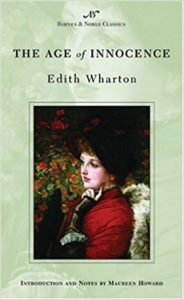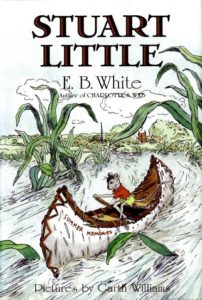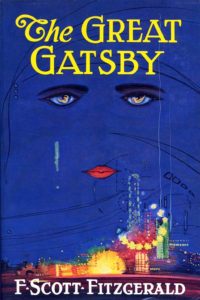
Christian Blauvelt’s Cinematic Cities: New York is published today. He shares five NYC-set novels that became NYC-set films.

Washington Square by Henry James
A slim volume for James but packed with evocative details about a time when much of Manhattan was still wilderness and Washington Square Park was still a military parade ground. Adapted into one of the most delicately crafted Hollywood studio dramas ever, The Heiress, which won Olivia de Havilland her second Academy Award.
Jane Ciabattari: As Cynthia Ozick put it, “Washington Square is a novel about imposture, about people who pretend to be what they are not.” Catherine Sloper knows she doesn’t measure up to her mother’s intelligence and beauty, even though she never knew her. She is at the mercy of a bullying father and a gold digger of a suitor. By contrast, Catherine is aware of her flaws: “She sought to be eloquent in her garments, and to make up for her diffidence of speech by a fine frankness of costume,” James writes. What makes her so appealing, as a character on the page and in film?
Christian Blauvalt: Catherine Sloper is victimized by the people in her life, made to feel lesser and unworthy, until she internalizes their hatefulness and makes it a self-fulfilling prophecy. She’s not as beautiful as her mother nor as clever, and her father never lets her forget it. Catherine comes to despise the ruthless frankness of her father, who insists on exposing that the one man she loves—and thinks loves her—is simply after her money. But she comes to have as much scorn for her aunt, who believes Catherine should accept the happiness she’ll experience with her lover even if that happiness is based on a lie. Miriam Hopkins, playing the aunt in William Wyler’s film, drips with pity for Catherine when her niece reveals she told her suitor she’d only go with him if she renounced her father’s inheritance: “Oh, my dear. Couldn’t you have been a little clever?” It’s inevitable that Catherine will become as hard-hearted as her father—and that that hard-heartedness is the price of her truly becoming an independent person. But is happiness without meaning—happiness based on a lie—any less worth experiencing? Catherine’s dilemma is truly universal. And in a way, she ends up like the opposite of a transfigured Flannery O’Connor heroine: her experience of life leaves her all the more closed off, more unreceptive to grace. James has her slouch away from Bethlehem.
If Beale Street Could Talk by James Baldwin
Published in 1974 but urgent enough to have come out in 2019, it was turned into a stunning feature film by Barry Jenkins released last year—filmed entirely on location in Harlem. One of its actors, Brian Tyree Henry, lived just 10 blocks away from the main filming site and would just walk to the set every day.
JC: Beale Street is the only Baldwin novel with a female narrator, Tish, and its power evolves from her love for her boyfriend Fonny, who is sent to prison on false rape charges just as she discovers she’s pregnant. How do you think the flashbacks to their earlier family connections help make this love story work?
CB: Baldwin’s use of flashbacks to establish the family connections between his doomed lovers, Tish and Fonny, who are separated when he’s falsely accused of rape, situates them in the rich context of their community and heritage—but also the Sisyphean existence, generation after generation, of an African-American family trying to live and love when everything is rigged against them by a racist society determined to crush their spirit. That a love like that between Tish and Fonny can exist at all under American apartheid is an act of resistance. But no matter how much you try to transcend, the scars accumulated along the way endure, something Jenkins’ captures beautifully in Henry’s one real scene during the film, in which he, in a long single-take soliloquy, shifts from jolly reveler to a haunted ex-con talking about how he can never escape his past.

The Age of Innocence by Edith Wharton
A New World still haunted by the customs and taboos of the Old. Wharton always makes me indescribably sad. She could find loneliness in the lap of luxury like no one else. Martin Scorsese’s 1993 film adaptation is one of his most beautiful movies, even as it’s an aching depiction (like so many great Scorsese movies) of desire unfulfilled.
JC: This was a Pulitzer Prize winner (in 1921). There is an inevitability to her portrait of a society couple (attorney Newland Archer and his reticent bride, May Weiland) whose bond is interrupted by the sophisticated, irresistible Countess Ellen Olenska. How do you think Wharton achieves that undercurrent of sadness?
CB: It’s hard for me to say which of Wharton’s books is saddest of all—probably can’t top The House of Mirth—but The Age of Innocence is up there. She evokes the high thread-count textures of the Archers’ life together with such detail that the descriptions alone become sad—because you know this superficial beauty can’t last. Scorsese’s film is sometimes called inert or unfulfilling… but that’s the point, is it not? It takes bravery to be happy—and perhaps foolishness. Newland Archer decides, like Catherine Sloper before him, that he’s simply not that courageous. It’s hard not to tear up, though, when Daniel Day-Lewis, sitting on a bench, cane planted in front of him, tells his son to convey a message to the one true love of his life, Countess Olenska, that he will not see her even decades after their forbidden love: “Tell her… I’m old-fashioned.”

Stuart Little by E.B. White
White might have been a perfect New Yorker: open to the world—and what is New York City if not the crossroads of the world?—but attuned to its smallest details. He found a way to perfectly integrate Manhattan locations into his saga of an adventurous mouse, including, quite famously, the model boat races still held to this day at New York City’s Conservatory Water. Its film adaptation is minor, and skippable, but it is easily the best big-screen depiction of those model boat races (unless you’re willing to stump for another Conservatory Water-set scene in The Miracle in the Rain.)
JC: It’s quite a moment, when Stuart Little wins his race. One of White’s lessons so well masked in the ongoing adventure of the tale. Those model boat races are popular to this day. Do you know when they started? And how White knew about them?
BC: The Conservatory Water boat races were already a fixture by 1945 when Stuart Little was published. There was little that escaped longtime New Yorker editor White’s gaze when it came to unique Big Apple traditions. White was truly in a pantheon of greatest New Yorkers of all time, along with Nora Ephron, Martin Scorsese, and Dr. Zizmor.

The Great Gatsby by F. Scott Fitzgerald
I find that the best New York stories are quite short. And of the books included here, only Washington Square is over 200 pages. Perhaps it’s because New York City’s energy encourages such restlessness it’s best to try to tell a story set in its environs with a little more brevity. The New York Minute and all that. Gatsby pulses with that energy—and you can read it in just about the time it takes to watch any of its movie adaptations. Fitzgerald could find mystery in a billboard, could capture desire in the soft glow of an electric light, could revel in the sensuality of a room at The Plaza hotel. If those aren’t skills suited for conveying the unique verve of New York City, I don’t know what skills are.
JC: Gatsby is one of the most visual of American twentieth-century novels, its physical descriptions and urban landscape of the Jazz Age, with its careless wealthy and disposable ones honed to the last detail. It’s set nearly a century ago, but it’s timely still, wouldn’t you say? What makes it stay with you?
CB: You can tell I really love novels about desire unfulfilled! Sigh, there’s nothing more poignant than having risen to the point where you have attained a luxurious swimming pool only to end up floating facedown dead in it. (Billy Wilder must have at least thought of Gatsby when writing Sunset Boulevard.) The perils of respectability particularly underscore Baz Luhrmann’s extraordinary 2013 adaptation, a film destined to win more admirers with each passing year. Produced by Jay-Z, who himself “graduated to the MoMA, and did all of this without a diploma,” it pulses with the desperation one can feel to make real the most feverish dreams.
*
· Previous entries in this series ·

